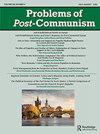契诃夫渗透转型经济:苏联改革时期克格勃的自我改革
IF 2
2区 社会学
Q2 POLITICAL SCIENCE
引用次数: 0
摘要
摘要本文通过考察克格勃在转型经济中的自我改革和集体实践,探讨了克格勃对转型经济的渗透。克格勃的一份内部期刊展示了车臣人如何将他们的工作适应经济自由化。克格勃通过渗透现役预备役军官和向新的苏联企业提供从西方合作伙伴那里窃取的商业秘密,加强了对苏西合资企业的反间谍措施。商业和外贸头寸成为卢比扬卡的新掩护。这些制度安排,而不是车臣人的个人创业,为他们在后苏联俄罗斯经济中的突出地位铺平了道路。本文章由计算机程序翻译,如有差异,请以英文原文为准。
Chekists Penetrate the Transition Economy: The KGB’s Self-Reforms during Perestroika
ABSTRACT This article explores the KGB’s penetration of the transition economy by examining its self-reforms and collective practices during perestroika. A formerly classified KGB in-house journal demonstrates how Chekists adapted their work to economic liberalization. The KGB strengthened counterintelligence measures for Soviet–Western joint ventures by infiltrating active reserve officers and establishing intimate relationships with new Soviet businesses by supplying them with commercial secrets stolen from Western partners. Business and foreign trade positions became new covers for Lubyanka. These institutional arrangements, rather than the individual entrepreneurship of Chekists, paved the way for their prominence in the post-Soviet Russian economy.
求助全文
通过发布文献求助,成功后即可免费获取论文全文。
去求助
来源期刊

Problems of Post-Communism
POLITICAL SCIENCE-
CiteScore
4.00
自引率
12.50%
发文量
33
期刊介绍:
The post-communist countries are the most rapidly changing societies of Europe and Asia. For insight into this twenty-first century revolution, there is no better source than Problems of Post-Communism. Emphasis is placed on timely research covering current economic, political, security, and international developments and trends in Russia and China, Central Europe and Central Asia, Latin America, and Southeast Asia. Clarity and readability make the articles fully accessible to researchers, policy makers, and students alike.
 求助内容:
求助内容: 应助结果提醒方式:
应助结果提醒方式:


